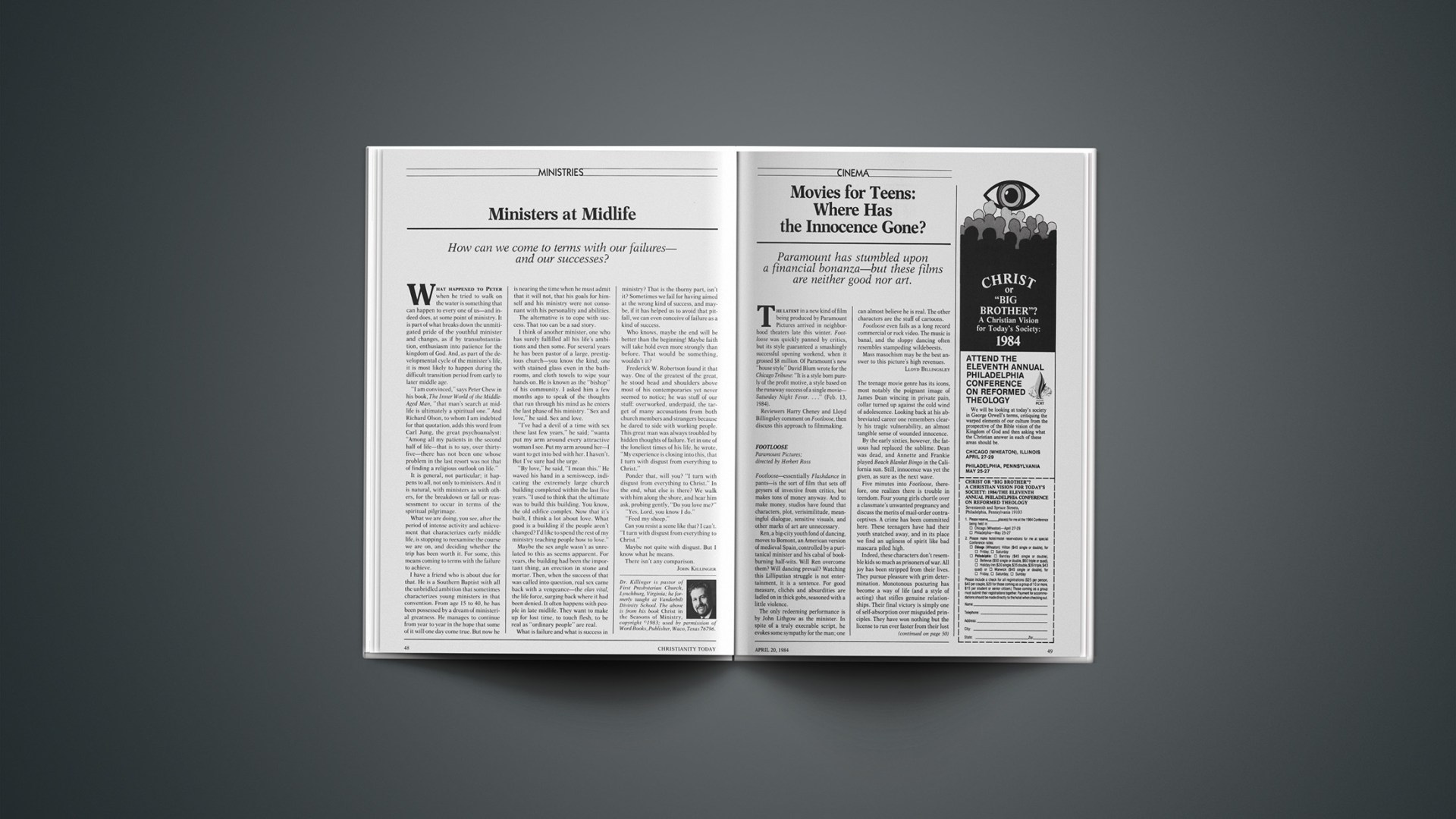How can we come to terms with our failures—and our successes?
What Happened To Peter when he tried to walk on the water is something that can happen to every one of us—and indeed does, at some point of ministry. It is part of what breaks down the unmitigated pride of the youthful minister and changes, as if by transubstantiation, enthusiasm into patience for the kingdom of God. And, as part of the developmental cycle of the minister’s life, it is most likely to happen during the difficult transition period from early to later middle age.
“I am convinced,” says Peter Chew in his book, The Inner World of the Middle-Aged Man, “that man’s search at midlife is ultimately a spiritual one.” And Richard Olson, to whom I am indebted for that quotation, adds this word from Carl Jung, the great psychoanalyst: “Among all my patients in the second half of life—that is to say, over thirty-five—there has not been one whose problem in the last resort was not that of finding a religious outlook on life.”
It is general, not particular; it happens to all, not only to ministers. And it is natural, with ministers as with others, for the breakdown or fall or reassessment to occur in terms of the spiritual pilgrimage.
What we are doing, you see, after the period of intense activity and achievement that characterizes early middle life, is stopping to reexamine the course we are on, and deciding whether the trip has been worth it. For some, this means coming to terms with the failure to achieve.
I have a friend who is about due for that. He is a Southern Baptist with all the unbridled ambition that sometimes characterizes young ministers in that convention. From age 15 to 40, he has been possessed by a dream of ministerial greatness. He manages to continue from year to year in the hope that some of it will one day come true. But now he is nearing the time when he must admit that it will not, that his goals for himself and his ministry were not consonant with his personality and abilities.
The alternative is to cope with success. That too can be a sad story.
I think of another minister, one who has surely fulfilled all his life’s ambitions and then some. For several years he has been pastor of a large, prestigious church—you know the kind, one with stained glass even in the bathrooms, and cloth towels to wipe your hands on. He is known as the “bishop” of his community. I asked him a few months ago to speak of the thoughts that run through his mind as he enters the last phase of his ministry. “Sex and love,” he said. Sex and love.
“I’ve had a devil of a time with sex these last few years,” he said; “wanta put my arm around every attractive woman I see. Put my arm around her—I want to get into bed with her. I haven’t. But I’ve sure had the urge.
“By love,” he said, “I mean this.” He waved his hand in a semisweep, indicating the extremely large church building completed within the last five years. “I used to think that the ultimate was to build this building. You know, the old edifice complex. Now that it’s built, I think a lot about love. What good is a building if the people aren’t changed? I’d like to spend the rest of my ministry teaching people how to love.”
Maybe the sex angle wasn’t as unrelated to this as seems apparent. For years, the building had been the important thing, an erection in stone and mortar. Then, when the success of that was called into question, real sex came back with a vengeance—the elan vital, the life force, surging back where it had been denied. It often happens with people in late midlife. They want to make up for lost time, to touch flesh, to be real as “ordinary people” are real.
What is failure and what is success in ministry? That is the thorny part, isn’t it? Sometimes we fail for having aimed at the wrong kind of success, and maybe, if it has helped us to avoid that pitfall, we can even conceive of failure as a kind of success.
Who knows, maybe the end will be better than the beginning! Maybe faith will take hold even more strongly than before. That would be something, wouldn’t it?
Frederick W. Robertson found it that way. One of the greatest of the great, he stood head and shoulders above most of his contemporaries yet never seemed to notice; he was stuff of our stuff: overworked, underpaid, the target of many accusations from both church members and strangers because he dared to side with working people. This great man was always troubled by hidden thoughts of failure. Yet in one of the loneliest times of his life, he wrote, “My experience is closing into this, that I turn with disgust from everything to Christ.”
Ponder that, will you? “I turn with disgust from everything to Christ.” In the end, what else is there? We walk with him along the shore, and hear him ask, probing gently, “Do you love me?”
“Yes, Lord, you know I do.”
“Feed my sheep.”
Can you resist a scene like that? I can’t.
“I turn with disgust from everything to Christ.”
Maybe not quite with disgust. But I
know what he means.
There isn’t any comparison.
Dr. Killinger is pastor of First Presbyterian Church, Lynchburg, Virginia; he formerly taught at Vanderbilt Divinity School. The above is from his book Christ in the Seasons of Ministry, copyright ©1983; used by permission of Word Books, Publisher, Waco, Texas 76796.










